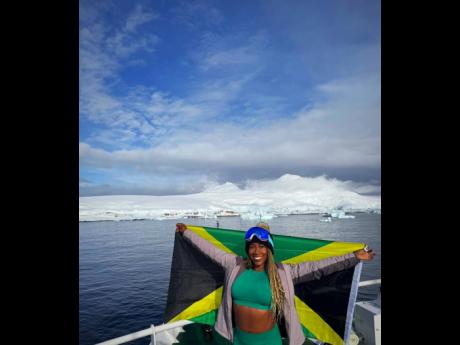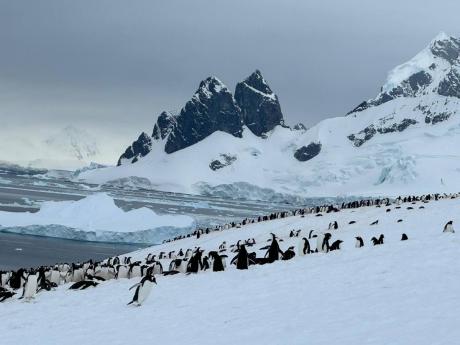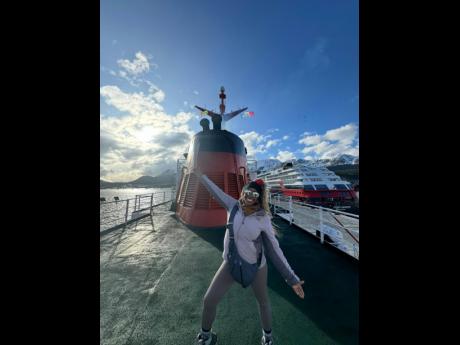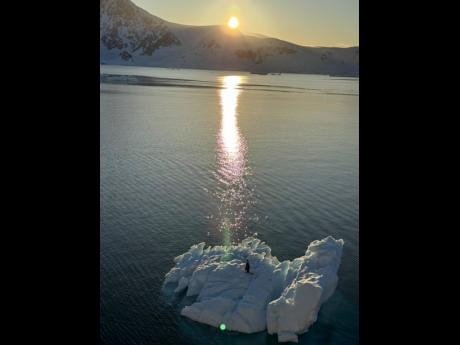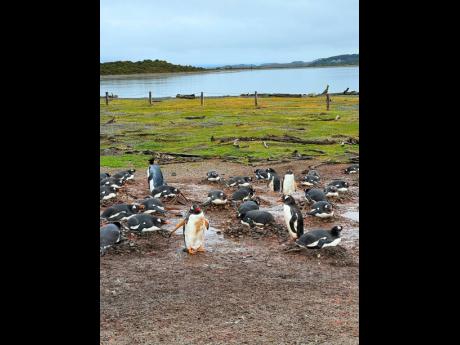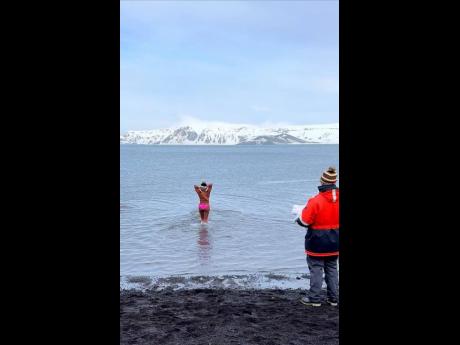Jamaican globetrotter Renee James takes Antarctica
Having completed her voyage to Antarctica, Jamaica-born globetrotter Renee James is holding it as a once-in-a-lifetime experience.
“It was amazing,” she began, “I would say some of the things I was most taken aback by was the size of everything, just the vastness of everything. When you are able to go to a new continent and there are no trees, no flowers, no buildings, you can really just appreciate the scale. And, because of the nature of the continent, its ruggedness, everything shoots right out of the water.”
The 36-year-old said her anticipation was building after boarding the Ushuaia, the passenger ship from Patagonia that would be her home for the 10-day excursion. There, James, alongside some 700 other explorers, would undergo extensive training to ensure their safe crossing and the preservation of the uninhabited continent.
While the accommodation on the ship itself was comfortable, James’ initial fears about whether she would experience the ‘Drake shake’ or the ‘Drake lake’, referring to the roughness of the passage, were swiftly realised and validated. Greeted by the 'shake', James never got seasick, but says the turbulent waters left her in far more discomfort than she anticipated.
“There were times that the Drake was so rough, you could feel the propellers, and the shaft or the stern of the ship being lifted out of the water. So the waves were so rough that at times parts of the ship was out of the water and you could feel the ship elevate then drop and slam back into the water. And, if the propellers were out, you would then feel the ship vibrate strongly.”
She said, for the two days that it took them to cross the Drake, they were advised not to be in the shower, so as not to slip, and, while sleeping, to tuck themselves into their beds so as to not get tossed around the cabin until finally they arrived at the southernmost part of the world.
“Before we were able to go to the continent, we had to do a huge check. So they gave us [specific] boots to wear because we don’t want to bring any foreign seeds or dirt from other continents over to Antarctica, because it would completely mess up the environment there.”
With a world of rules embedded in her mind, James was able to board a zodiac, a small boat used to ferry people between the ship and land, to visit the continent twice daily.
Standing next to landforms with 90 degree inclines, James said she was in awe. The reverential experience was only heightened by the disposition of the native animals.
“Once you’re there, because a lot of these animals are not used to seeing people, they’re not afraid of you at all,” she explained. “So you’ll just be walking and a penguin will just come and walk right in front of you. In Antarctica, the wildlife have right of way. So, if you are walking and a penguin just starts walking right in front of you, you have to stop and you just let that penguin go about its merry way. So it was really interesting.”
“One day on the zodiac, some humpback whales were kind of curious like 'what is this in the water?', and a pod of maybe six humpbacks just started swimming right up to our boat.”
James said even though they could only see about one-eight of their bodies, she was blown away by just the vastness of these majestic beasts.
While the beauty of the environment was captivating, she said being at the helm of the world opened her eyes to the true impact of climate change.
“I think it was what I imagined. It wasn’t as cold as what I thought it was going to be. I would say it was maybe around 20 degrees Fahrenheit most days. Its supposed to be colder. Maybe you’ve heard about the melting ice caps at the South Pole, we did see a lot of that. So, because its warmer, the icecaps are melting. Even before we got to Antarctica, we saw a huge ice shelf that would take the span of like a block. Something like an entire street would just be floating in the water.”
She continued, “My friend who went with me, she is Latina, so she is kind brown-skinned and, because of the hole in the ozone layer, she, for the first time in her life, got sunburn in a place that’s [experiencing] winter. So I think it was really interesting because these are all things that I’ve read about, but to see [it] in person, you are now living the thing that you’ve learned about in school.”
With less and less snow accumulation on what should be the coldest part of the world, James says it is impossible for her to ignore her carbon footprint. Confirming James’ hypothesis, Kasha Patel and Naema Ahmed, climate journalists at the Washington Post, reported that this year’s abnormally warm temperatures have melted several previously snowy regions on the continent.
As part of the expedition, visitors receive daily lectures aboard the ship on conservation, wildlife, climate change and global water currents, among other topics.
James recalls, during those lectures, the group was cautioned against ignoring the weather.
She explained, “The weather can change immediately. There is one day that we did a landing. So we got unto the continent and we were ready to start walking around and, all of a sudden, the weather changed and we had to get right back on the boats, because sometimes, if the weather changes and you are still on the continent, you might be stuck there. So we had to be really mindful of that.”
“I think the trip has changed me in terms of being a bit more mindful. I think, when we last spoke, I already was in the minds of conservatism and being mindful of the products that I use and how I dispose of waste. But I think now I perhaps want to join organisations so that I can understand more about the impact that we’re having. Before I left, New York City was actually flooded, so you’re seeing that icebergs are melting there. And then, where I live, somewhere else, the city is being flooded because it is an island. So I do see now first-hand how things I’ve learned in school are absolutely connected to things that are happening in different continents that I live in.”
After concluding the isolating 10-day expedition, James shared she was filled with a rush of dopamine upon returning to inhabited grounds.
“When I came back, I was overwhelmed with how bright and golden the sunshine was. How really green the trees were, because, when you’re on a ship for 10 days and you’re only seeing shades of white and blue, and I wouldn’t even say black because it was summer at the South Pole so the sun never set. So we never saw night-time, it was just daytime 24/7. You’re only seeing basically three shades at most, so, when I came back to the other continent, South America, and was seeing green and sunshine, it was really kind of overwhelming and my brain was just like flooded with joy again. I think the dopamine was coming back,” she laughed
While not eager to cross the Drake again, she summed up the experience saying, “I think, maybe, with the cost of it and the difficulties crossing the Drake, it's a once-in-a-lifetime kind of thing but I do think, if you are person who is interested in the environment, a big traveller and a traveller who travels ethically, I think its definitely an experience that I would recommend.”
|

